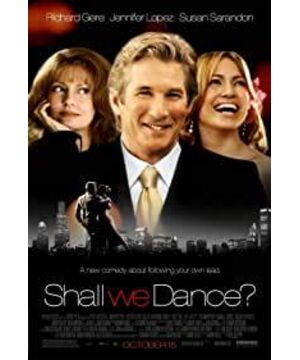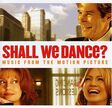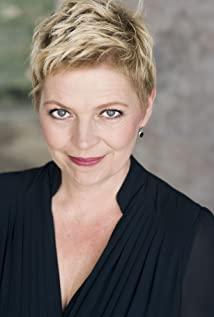It happened to be in STARTV that I saw Hollywood adaptation of the Japanese film "SHALL WE DANCE" (talking about love, dancing) of the same name.
The protagonist Richard Gere, a typical New York middle class, has a decent lawyer job in the city center, a beautiful big house in the suburbs, and a good wife and good girl at home. This is simply the classic life struggle of Chinese urban white-collar workers. The ultimate picture. But after he spent more than 20 years so peacefully and happily from nine to five in the morning, suddenly one day, tiredness struck inexplicably.
Confused, decided to learn to dance the national standard dance. In fact, the real reason is that through the subway window when he gets off work every day, he will see a beautiful figure standing in front of the window of a dance school that evokes his imagination. It's better to say you want to go hunting if you want to learn to dance.
His wife found that something was wrong, and commissioned a middle-aged private investigator to investigate. After learning that her husband was going to dance, she couldn’t understand: "Why?" The detective’s young black male assistant replied with Thoreau’s words: "Most men They all live a life of desperation, and they don’t want to be silent anymore.”
Using the (Western) fashionable psychological explanation, Richard Gere encountered a midlife crisis!
When most middle-aged men encounter this situation, they think that by finding a young and lively third party, they can turn back the clock and find their passion again. Richard Gere thought the same at first, but this attempt was quickly dismissed by the beauty coach. He woke up from the dream of an affair, and found that he really liked dancing before he knew it. So, by accidentally hitting the land, found a solution to the crisis. The joy of life is back, the wife understands, and the man is refreshed.
Hollywood is indeed Hollywood, with American youth and simplicity, it easily portrays Richard Gere’s crisis as an inspirational case-that is, as long as a person finds his true pleasure, he can find it again. For yourself, get through the crisis and refresh yourself.
The film also tells a few similar cases to fully illustrate the central idea (Hollywood film, the director is afraid that the mentally retarded audience will not understand the matter, and the theme is often remarked repeatedly. It is very consistent with our domestic composition for middle school students and political thoughts of college students. Reporting requirements). A bald colleague like Richard Gere was shy about discussing dancing with people in the office, because he was afraid of not being masculine. At the end of the movie, he finally dared to express his love for dancing in the office, so he cheered up; like that fat waitress, she has a lot of life in life. Small and inconspicuous, I want to realize my dream of being a heroine while dancing. The ending credits, the dream comes true, so I cheer up; like that gay man, he constantly emphasizes his masculinity while dancing, trying to deny his authenticity, ending, finally Accept yourself and cheer yourself up.
I have watched the Japanese movie of the same name for many years (1996), but my impression is far from that simple. In retrospect, the whole film seems to have been permeated with an inexplicable sense of emptiness, even after the actor Yoshisho Koji began to really like dancing.
The film seems to keep asking, does the so-called "real you" exist? Perhaps the joy of dancing is just to steal your life for half a day, right? And behind, there is endless emptiness waiting for you! Those who can't escape, everyone can't escape. Life is just a doomed end, a temporary process of stealing pleasure-"Birth is to die, to approach is to leave, and to fall in love is to be separated".
Both Richard Gill and Yakusho Hiroshi both acted as a killer, both courteous and tall. Richard Gill's expression was childish. As he learned to dance, his face became simpler and happier. Yakusho Koji is indeed happy when dancing, but there will always be some free expressions on his face from time to time, making you worry, next step, this silent middle-aged man will laugh again?
A reporter interviewed Ah Cheng and asked: "You see things so thoroughly, do you have no passion in life? Have you ever had a middle-aged crisis?" Ah Cheng answered the previous question: "My mood is very calm." The latter question, No answer.
In fact, the reporter who asked the question held the Hollywood mindset-how to overcome a crisis, and then how to continue to stride forward. A Cheng's refusal to answer, I think, may be an answer-life doesn't really matter whether there is a crisis or not, it will always be there, and you will always be in crisis.
I don’t know what to say in my friend’s phone call. Fame, fortune, official position, and Fengyue are not enough reasons to persuade this friend. I have to let him fall into this crisis, and then wait for the next crisis to come, until numbly happy. Or soberly suffering in crisis.
Don't ask me if I have ever had a crisis. My choice is the same as that of Acheng, so I don't answer.
View more about Shall We Dance reviews











